London Fire Brigade had busiest day since World War Two, says London mayor
London's fire service had its busiest day since World War Two dealing with multiple blazes in record-breaking temperatures on Tuesday, London Mayor Sadiq Khan has said.
The capital was one of 15 areas around the UK to declare a major incident.
The fires started on a day which saw a record temperature of 40.3C (104.5F) in Coningsby, Lincolnshire.
Wednesday has been cooler for most but thunderstorms are forecast in central England.
A yellow warning has been issued by the Met Office for heavy showers and thunderstorms which could bring disruption in eastern and south-east England on Wednesday evening.
Despite falling temperatures, the weather is continuing to affect transport, with Network Rail advising passengers to only travel if necessary.
By mid-afternoon LNER services from London to Scotland were starting up again, while trains on the East Coast Mainline resumed after a fire in Bedfordshire.
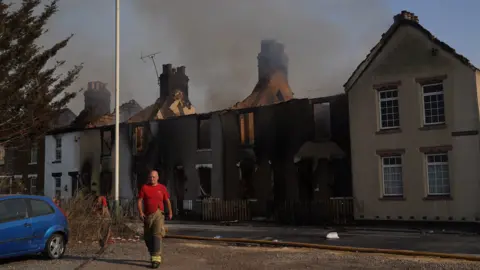 PA Media
PA Media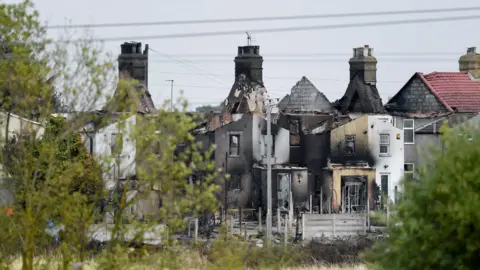 Reuters
Reuters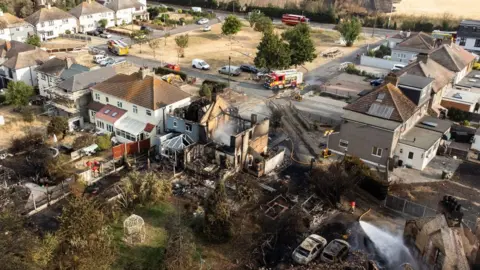 Getty Images
Getty ImagesMr Khan said London Fire Brigade (LFB) received 2,600 calls as it dealt with multiple fires. He earlier told Sky News 41 properties were destroyed in London on Tuesday.
In Wennington, east London, 100 firefighters tackled a blaze which destroyed several homes.
LFB said two rows of terraced houses, four other homes, 12 stables and five cars were destroyed by the blaze, while one firefighter at the scene described it as "absolute hell".
Dramatic images from the scene showed smoke billowing from buildings, some with their roofs collapsed, and extensive damage to the surrounding land.
Speaking to BBC Radio 4's Today programme, Mr Khan said: "Yesterday was the busiest day for the fire service in London since the Second World War.
"Normally we get 350 calls a day, on a busy day we can get up to 500 calls. Yesterday the fire service had more than 2,600 calls a day."
The mayor has advised Londoners not to have barbecues in parks or private gardens over concerns they could set alight grass.
LFB assistant commissioner Jonathan Smith said he had not seen anything like the "sheer scale across the whole of London" as the brigade dealt with 15 major fires, and a large number of wildfires and grassland fires.
The heat and dry conditions created "the perfect scenario" for fires to spread rapidly across grassland and woodland, with the speed a particular challenge, he said.
Speaking in Wennington, he said the brigade had never before asked firefighters to operate when the temperature outside was 40C.
"We're obviously thinking very carefully about how we can be even better prepared as we move forward, because what we do know is that climate change is going to continue to pose challenges for us."
Elsewhere, a number of homes were destroyed by fire in Norfolk, and major incidents were declared in Leicestershire, Hertfordshire, Suffolk, Lincolnshire and Yorkshire., among others.
At Prime Minister's Questions, Boris Johnson thanked firefighters and said he had spoken with the chair of the National Fire Chiefs Council.
LFB said 16 firefighters had heat-related injuries - two of whom were taken to hospital but have since been discharged. South Yorkshire Fire and Rescue said four from their crews had been taken to hospital but have made a full recovery.
Speaking after PMQs, Cabinet Office minister Kit Malthouse told MPs some of the pressure would now ease as the "fiercest heat has subsided" but he warned the summer was likely to bring further hot weather and the risk of wildfire remained elevated.
"That is why we are treating this heatwave as an exacting test of our national resilience and contingency planning," he said.
'My house is completely gone'
Tim Stock alerted the fire brigade when he saw flames near his home in Wennington.
Mr Stock, whose house was destroyed, told BBC Radio 5 Live he and his son had spotted the fire in his neighbour's garden but, despite their best efforts with a hose and watering can, had been unable to stop it spreading.
"I reckon about 15 to 20 houses might be gone or uninhabitable," he said.
"My house is completely gone, as is the next door neighbour's and three or four other houses along that bit."
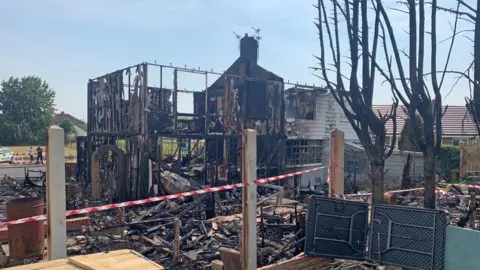 PA Media
PA MediaThe Fire Brigades Union (FBU) has accused government spending cuts of hampering the fire service's ability to react.
Matt Wrack, the union's general secretary, said firefighters were "at the forefront of the climate emergency" but, while the demands of the job were increasing, their resources had been cut by government for over a decade with 11,500 firefighter jobs cut since 2010.
Speaking about the LFB, Mr Khan said he inherited closed fire stations, cancelled engines and firefighters losing jobs when he took over as mayor from Boris Johnson.
He said he has been rebuilding the capital's fire service with kit and more firefighters.


Phil Garrigan, who leads the National Resilience group for the National Fire Chiefs Council, said the UK must now consider what equipment it had to fight wildfires.
He said most European countries where significant wildfires occur have planes or helicopters which can collect or distribute water to areas where fire is developing.
Meanwhile, Just Stop Oil demonstrators climbed motorway signs on the M25, near Cobham, Surrey, to protest at the extreme temperatures in the UK.
Police closed sections of the motorway and at one stage there were five-mile traffic queues approaching junction 30 in Essex, National Highways said.
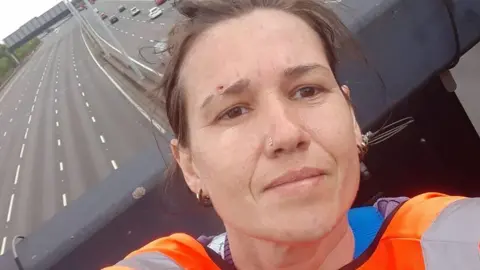 Just Stop Oil/Press Association
Just Stop Oil/Press AssociationThe latest Met Office provisional figures show that Scotland's record-breaking highest temperature, hit on Tuesday, was higher than first thought, with 35.1C registered at Floors Castle in Kelso.
Heatwaves have become more frequent, more intense, and last longer because of human-induced climate change, and that hot, dry weather is likely to fuel wildfires.
The world has already warmed by about 1.1C since the industrial era began and temperatures will keep rising unless governments around the world make steep cuts to emissions.
Met Office chief scientist Prof Stephen Belcher said Tuesday's temperatures were striking due to the large record-breaking margin and the extensive area of the UK experiencing the severe temperatures.
But "aggressive emissions cuts" could very sharply reduce the frequency of extreme temperatures, he told BBC News.

Were you affected by Tuesday's fires? You can share your experiences by emailing [email protected].
Please include a contact number if you are willing to speak to a BBC journalist. You can also get in touch in the following ways:
- WhatsApp: +44 7756 165803
- Tweet: @BBC_HaveYourSay
- Upload your pictures/video here
- Or fill out the form below
- Please read our terms & conditions and privacy policy
If you are reading this page and can't see the form you will need to visit the mobile version of the BBC website to submit your question or comment or you can email us at [email protected]. Please include your name, age and location with any submission.

